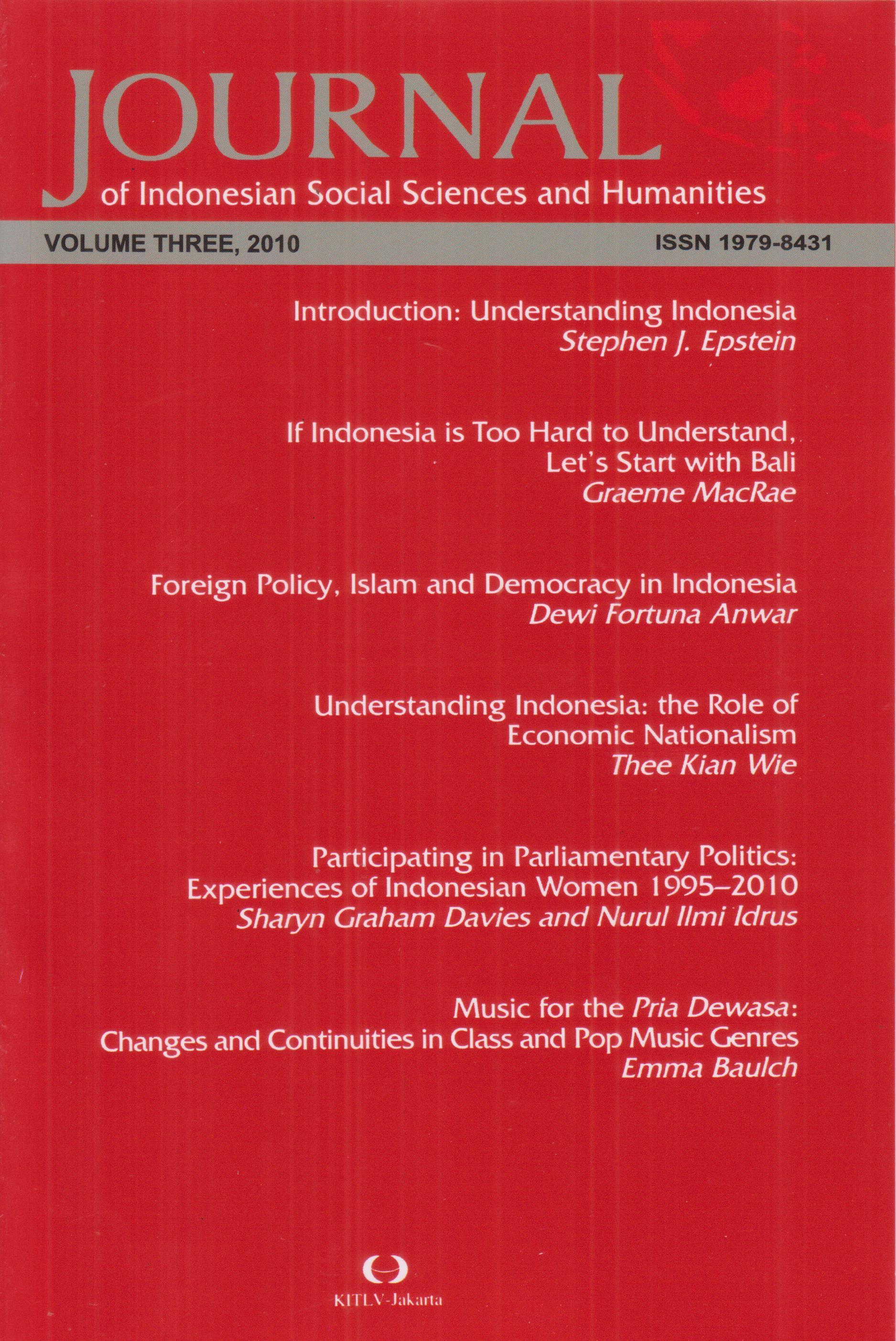Understanding Indonesia: the Role of Economic Nationalism
Abstract
In this paper it is argued that economic nationalism in Indonesia, in its various manifestations, has been an important factor in determining particular economic policies since Indonesia’s independence up to the present. These economic policies particularly related to the ownership of productive assets owned by foreigners or by residents considered to be ‘foreign’, particularly Dutch business interests before 1957 and the ethnic Chinese, including Sino-Indonesians, and to the economic functions performed by foreigners or by ‘foreign’ residents. Focusing on one factor alone to understand Indonesia, specifically Indonesia’s economic policies over time, is necessarily arbitrary and subjective. However, looking at Indonesia’s modern economic history since independence through the prism of economic nationalism does to an important degree explain or highlight the major considerations underlying particular economic policies of the Indonesian government because they reflected Indonesia’s national aspirations or national interests.
References
Anspach, Ralph. (1969). ‘Indonesia’. In Frank Golay, Ralph Anspach, M Ruth Pfanner and Eliezer B Ayal. (1969). Underdevelopment and economic nationalism in Southeast Asia. Ithaca and London: Cornell University Press. pp. 111–201.
Baudet, H and M Fennema. (1983). Het Nederlands belang bij Indie. Utrecht: Aula.
Booth, Anne. (1998). The Indonesian economy in the nineteenth and twentieth centuries: a history of missed opportunities. London: Macmillan Press.
Coppel, Charles A. (1983). Indonesian Chinese in crisis. Kuala Lumpur: Oxford University Press.
Dick, Howard W. (1987). The Indonesian inter-island shipping industry: an analysis of competition and regulation. Singapore: ASEAN Economic Research Unit, Institute of Southeast Asian Studies.
Djojohadikusumo, Sumitro. (1986). ‘Recollections of my career’. Bulletin of Indonesian economic studies. 22(3): 27–39.
Djiwandono, J Soedradjad. (2000). ‘Bank Indonesia and the Recent Crisis’. Bulletin of Indonesian economic studies. 36(1), April: 47–72.
Glassburner, Bruce (ed.). (1971). The economy of Indonesia: selected readings. Ithaca and London: Cornell University Press.
Golay, Frank, Ralph Anspach, M Ruth Pfanner and Eliezer B Ayal. (1969). Underdevelopment and economic nationalism in Southeast Asia. Ithaca and London: Cornell University Press.
Grenville, Stephen. (1974). ‘Survey of Recent Developments’. Bulletin of Indonesian economic studies. 10(1), April: 1–32.
Higgins, Benjamin. 1957. Indonesia’s economic stabilisation and development. New York: Institute of Pacific Relations.
Johnson, Harry. (1972). ‘The ideology of economic policy in new states’. In (ed.) David Wall. Chicago essays in economic development. Chicago: University of Chicago Press. pp. 23–40.
Kahin, GMcT. (1997). ‘Some recollections from and reflections on the Indonesian revolution’. In (ed.) Abdullah Taufik. (1997). The heartbeat of the Indonesian revolution. Jakarta: PT Gramedia Pustaka Utama. pp. 10–27.
Lindblad, J Thomas. (2008). Bridges to new business: the economic decolonization of Indonesia. Leiden: KITLV Press.
Mackie, JAC. (1971). ‘The Indonesian economy, 1950–63’. In (ed.) Bruce Glassburner. The economy of Indonesia: selected readings. Ithaca and London: Cornell University Press. pp. 16–69.
Meijer, Hans. (1994). Den Haag–Jakarta; de Nederlands–Indonesische betrekkingen 1950–1962 [Den Haag–Jakarta; Netherlands–Indonesia relations 1950–1962]. Utrecht: Aula.
Ricklefs, MC. (1993). A history of modern Indonesia since c. 1300, 2nd edn. London: Macmillan Press.
Ramli, Rizal. (2003). ‘Life after the IMF’. Van Zorge report. 21 April 2003: 10–18.
Robison, Richard. (1986). Indonesia: the rise of capital. Sydney: Allen and Unwin.
Siahaan, Bisuk. (1996). Industrialisasi di Indonesia: sejak hutang kehormatan sampai banting stir [Industrialisation in Indonesia: from the debt of honour until the turnaround]. Jakarta: Pustaka Data.
Somers Heidhues, Mary. (1964). Peranakan Chinese politics in Indonesia. Ithaca: Interim Report Series, Modern Indonesia Project, Cornell University.
Suhadi Mangkusuwondo. (1967). ‘Industrialization efforts in Indonesia: the role of agriculture and foreign trade in the development of the industrial sector’. PhD thesis. Berkeley: University of California.
Suryadinata, Leo. (1992). Pribumi Indonesians, the Chinese minority and China. 3rd edn. Singapore: Heinemann Asia.
Suryadinata, Leo (ed.). (2006). Southeast Asia’s Chinese businesses in an era of globalization: coping with the rise of China. Singapore: Institute of Southeast Asian Studies.
Sutter, John. (1959). Indonesianisasi: a historical survey of the role of politics in the institutions of a changing economy, from the second world war to the end of the general elections (1940–1955). PhD thesis. Ithaca, Cornell University.
Taufik, Abdullah (ed.). (1997). The heartbeat of the Indonesian revolution. Jakarta: PT Gramedia Pustaka Utama.
Thee, Kian Wie. (1994). Reflections on Indonesia’s emerging industrial nationalism. Working Paper no. 1. Perth: Asia Research Centre, Murdoch University.
--------. (1995). Government business relations in Indonesia in historical perspective. Unpublished manuscript. Jakarta.
--------. (2005). ‘Indonesia’s first affirmative policy: the ‘Benteng’ program in the 1950s’. Lembaran sejarah [History papers]. 8(3): 33–46.
--------. (2006). ‘The Indonesian government’s economic policies towards the ethnic Chinese: beyond economic nationalism?’ In (ed.) Leo Suryadinata. Southeast Asia’s Chinese businesses in an era of globalization: coping with the rise of China. Singapore: Institute of Southeast Asian Studies.
--------. (2010). ‘The debate on economic policy in newly-independent Indonesia: the debate between Sjafruddin Prawiranegara and Sumitro Djojohadikusumo. Itinerario. March 2010.
Wall, David (ed.). (1972) Chicago essays in economic development. Chicago: University of Chicago Press.
World Bank. (1998). Indonesia in crisis: a macroeconomic update, Jakarta, July 1998.
--------. (2007). Indonesia: economic and social update, April 2007.
Downloads
Published
Issue
Section
License

This work is licensed under a Creative Commons Attribution-NonCommercial-ShareAlike 4.0 International License.
Authors who publish with this journal agree to the following terms:
1. Authors retain copyright and grant the journal right of first publication with the work simultaneously licensed under an Attribution-ShareAlike 4.0 International (CC BY-SA 4.0) license. This license allows others to remix, adapt, and build upon the work, as long as they credit the author and license their new creations under the same terms.
2. Authors may enter into separate, additional contractual arrangements for the non-exclusive distribution of the journal’s published version of the work (e.g., posting it to an institutional repository or including it in a book), provided there is an acknowledgment of its initial publication in this journal.
3. Authors are permitted and encouraged to post their work online (e.g., in institutional repositories or on their personal website) prior to and during the submission process, as this can lead to productive exchanges and increase citations of the published work (See The Effect of Open Access ).


















